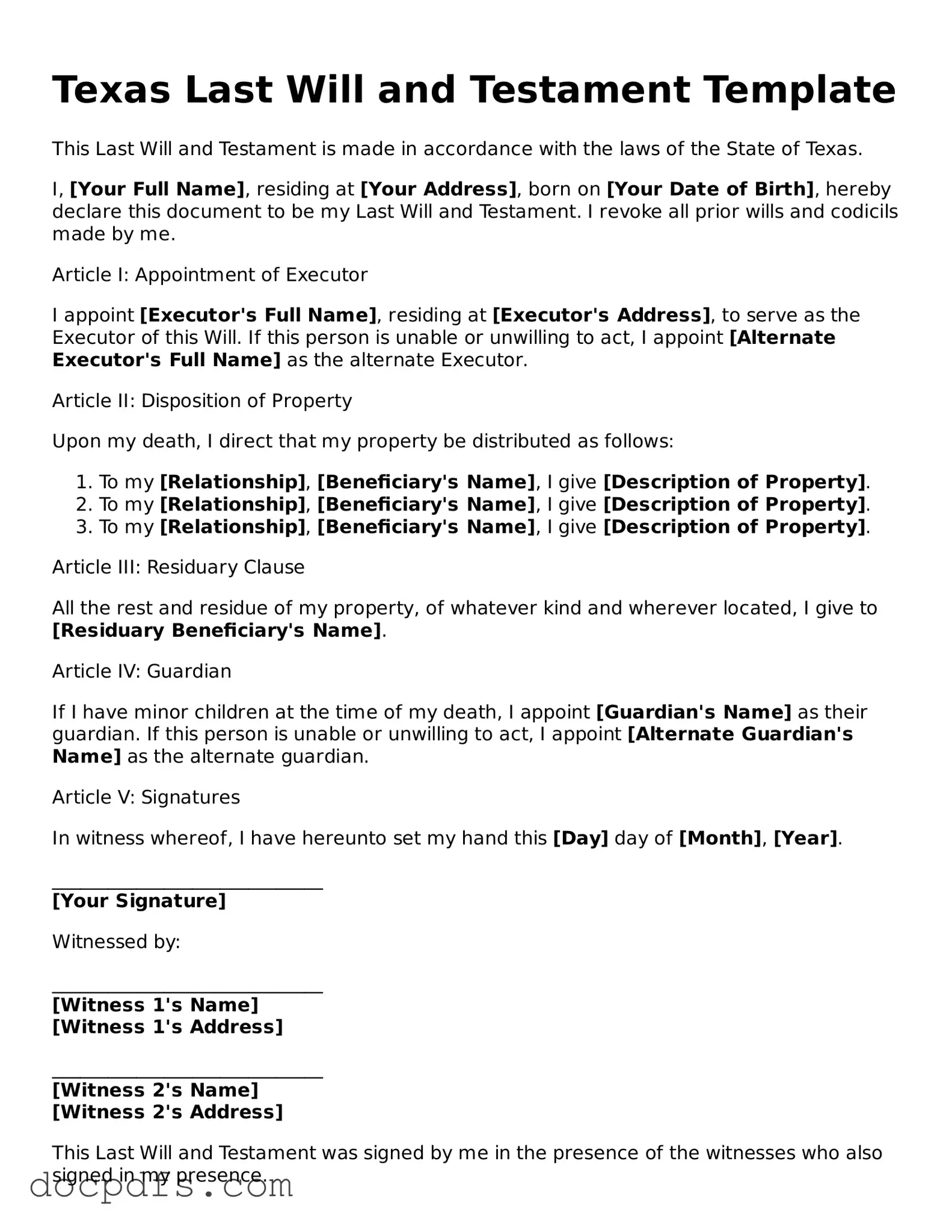What is a Last Will and Testament?
A Last Will and Testament is a legal document that outlines how a person's assets and affairs should be handled after their death. It allows individuals to specify beneficiaries for their property, appoint guardians for minor children, and designate an executor to manage the estate.
Who can create a Last Will and Testament in Texas?
In Texas, any individual who is at least 18 years old and of sound mind can create a Last Will and Testament. This includes residents of Texas as well as non-residents who own property in the state.
What are the requirements for a valid Last Will and Testament in Texas?
To be valid in Texas, a Last Will and Testament must meet the following criteria:
-
The document must be in writing.
-
The testator (the person making the will) must sign the document.
-
The will must be signed in the presence of at least two witnesses, who must also sign the document.
Alternatively, a holographic will, which is handwritten and signed by the testator, may also be valid without witnesses if it meets certain criteria.
Can I change my Last Will and Testament after it is created?
Yes, a Last Will and Testament can be changed or revoked at any time while the testator is alive. This can be done by creating a new will or by making amendments, known as codicils, to the existing will. It is important to follow the same legal requirements for signing and witnessing when making changes.
What happens if I die without a Last Will and Testament?
If a person dies without a Last Will and Testament, they are considered to have died intestate. In this case, Texas law dictates how the deceased's assets will be distributed, which may not align with the deceased's wishes. Typically, assets will be distributed to surviving relatives according to a predetermined hierarchy established by state law.
Can I include specific funeral arrangements in my Last Will and Testament?
Yes, individuals can include specific instructions regarding funeral arrangements in their Last Will and Testament. However, it is advisable to communicate these wishes to family members or a trusted individual, as the will may not be read until after the funeral has taken place.
How do I appoint an executor in my Last Will and Testament?
To appoint an executor, the testator must clearly name the individual in the Last Will and Testament. It is important to choose someone trustworthy and capable of managing the estate. The appointed executor will be responsible for carrying out the wishes outlined in the will and handling the probate process.
Is it necessary to have a lawyer to create a Last Will and Testament in Texas?
No, it is not necessary to have a lawyer to create a Last Will and Testament in Texas. Individuals can create their own wills using templates or online resources. However, consulting with a legal professional can help ensure that the will meets all legal requirements and accurately reflects the testator's intentions.
How can I ensure my Last Will and Testament is properly executed?
To ensure proper execution, the testator should follow these steps:
-
Draft the will according to Texas law.
-
Sign the document in the presence of two witnesses.
-
Ensure that the witnesses also sign the will.
-
Store the will in a safe place and inform the executor of its location.
Regularly reviewing and updating the will can also help maintain its validity and relevance over time.
What is a holographic will, and how is it treated in Texas?
A holographic will is a handwritten will that is signed by the testator. In Texas, a holographic will is considered valid even if it is not witnessed, provided that the material provisions are in the testator's handwriting. However, it is advisable to have a witnessed will to avoid potential disputes regarding the will's validity.

